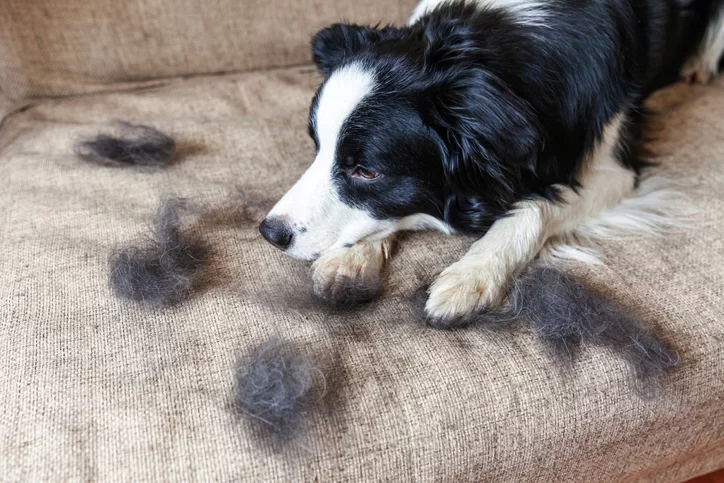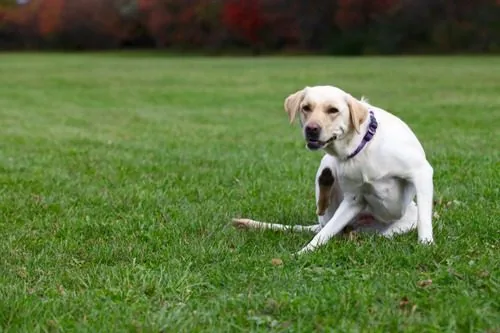6 Causes of Dog Shedding and How to Control It
Do you have a dog who sheds constantly? Do you find yourself wishing there was something you could do about this issue? If so, you’re not alone. There are several reasons why your dog might be shedding so much, and it’s important to get to the bottom of the cause as soon as possible.

If your dog is shedding more than you think is normal, be sure to take him to the veterinarian. Keep in mind, however, that you may just have a shedding dog to deal with, and you should look for some methods of keeping in this check by reading the article below.
Common Causes of Dog Shedding
6 common causes of dog shedding include, but aren’t limited to:
Breed
Some dogs may simply shed more than others, and this is just part of their natural genetic makeup. Labs, for example, are notoriously bad shedders. If you have a lab who sheds badly, there’s a chance that there may be very little you can do to control this shedding problem.
Even some of the most badly shedding breeds, however, can usually have their shedding somewhat controlled through proper grooming. By keeping up with regular grooming, you can keep your dog’s coat healthy and improve shedding conditions at the same time.
Improper Nutrition
By feeding your dog a balanced diet, you can provide better skin and coat health for your pet. The right diet for your dog can help improve his coat conditions and cut down on shedding as well, so feed your dog a high-quality kibble for best results.
Some dogs may also have food intolerances to certain ingredients present in their food. If your dog has a food intolerance, he may shed more often because of this. Skin and coat problems are common in dogs with food allergies and intolerances, so talk to your veterinarian for more information.
Stress
Just as humans’ hair can sometimes fall out due to stress, the same can happen with dogs and shedding. If your dog is shedding and seems to show other signs of stress or anxiety, you may be able to assume that this is the underlying cause of the coat issue.
If there have been any major changes in your household recently, this may be the cause of your dog’s shedding, especially if the two occurred close to each other in time. Talk with your vet if you think your dog may need to be on an anxiety medication to help with this issue.
Lack of Brushing
How often do you brush your dog? Depending on the type of dog you have and the type of coat he has, you may need to be brushing him much more often than you are. Some dogs need to be brushed daily in order to reduce shedding and keep their skin and fur healthy.
Be sure you choose the right type of brush and other grooming tools for your dog, too. By picking the right tools, you’ll be able to take care of your dog’s specific coat type and reduce the risk of increased shedding all year long.
Parasites
Some types of parasites may cause increased shedding in your dog. This may be true of intestinal parasites that affect your dog’s overall health and wellbeing, but it is even more commonly associated with skin parasites like fleas. A bad infestation of fleas may lead to significant shedding until the problem is resolved.
Additionally, there may be some other skin conditions that contribute to your dog’s shedding. Rashes, fungal infections, and hot spots may all cause your dog to shed excessively and may even cause bald patches in the most affected areas. Your vet will need to work with you to treat these types of problems.
Illness
Your dog’s coat and skin health are closely linked with his overall health. If your dog is sick with something, his skin and coat may suffer too. This may occur in the short-term if your dog is sick with something like a virus or a cold, or it may last a long time if your dog has chronic health conditions to manage.
The risk of illness in a dog who sheds excessively is the most important reason why you should take your pet to the veterinarian if you notice him shedding more than he should be.
Seek Additional Help for Managing Your Dog’s Shedding
With the help of this information, you should be more prepared to help your dog shed less and take care of whatever the underlying cause of the shedding might be, too. Remember that there are some factors you can control more easily than others when it comes to your dog’s shedding, however.
Contact The Village Vets today to make an appointment with our team if you have any further questions or concerns. We’ll help get to the root of your dog’s shedding, whether there’s an underlying health problem or not, and work with you to develop the best plan for managing it.
Recent Posts
About The Village Vets
The Village Vets is a network of animal hospitals based in Atlanta, GA and the surrounding area. We offer honest, excellent service to our clients in a comfortable, friendly atmosphere. To learn more about our locations and how we can better serve you and your pet, click the button below.
Share This Post
Recent Posts
About The Village Vets
The Village Vets is a network of animal hospitals based in Atlanta, GA and the surrounding area. We offer honest, excellent service to our clients in a comfortable, friendly atmosphere. To learn more about our locations and how we can better serve you and your pet, click the button below.



